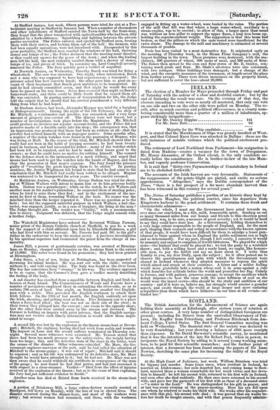IRELAND.
The election of a Member for Mayo proceeded through Friday and part of Saturday with the ardour of a close and doubtful contest ; but by the end of Saturday the result was sure. On the evening of that day, the electors intending to vote were so nearly all mustered, that only one vote on one side and two on the other side were polled on Monday. 'The re- sult, after so much exertion and political effervescence, in a county num- bering considerably more than a quarter of a million of inhabitants, ap- pears strikingly insignificant—
For Mr. Ouseley Higgins 141 For Mr. Isaac Butt 93
Majority for the Whig candidate 48
It is stated that the Marchioness of Sligo was grossly insulted at West- port, and that Colonel Knox Gore was attacked in Ballina : these are the only instances of notable violence which the political excitement pro- duced.
The retirement of Lord Northland from Parliament--his resignation is dated from Madeira—creates a vacancy for the town of Dungannon__ Mr. Henry Alexander, of the Oxford circuit, is the only candidate ac- tually before the constituency. He is brother-in-law of the late Mem- ber, and vaguely professes Conservatism.
It is said that "thirty-two Paymasterships of Constabulary in Ireland are to be abolished forthwith."
The accounts of the Irish harvest are- very favourable. Statements of the reappearance of the potato blight are partial, and excite no serious apprehension. "Altogether," says the Dublin correspondent of the Times, "there is a fair prospect of a far more abundant harvest than. has been witnessed in this country for several years."
The Nation of Saturday publishes a portion of an historic diary kept by Mr. Francis Meagher' the political convict, since his departure from. Kingstown harbour to the penal settlement. It contains these frank and characteristic admissions- " On the whole, I must say the Government have acted towards us, ever since our conviction, in a fair, mild, honourable spirit Sending us out so many thousand miles from our homes and friends to this cheerless penal settlement, was, to be sure, a measure of great severity; yet it would be hard to say they could have done less. As a Government, holding themselves te a very large extent responsible to the people of England, and, for the most part, shaping their counsels and acting in accordance with the known opinion of that people, it would have been difficult for them to adjudge a lesser tt. ishment to those against whom in England the public sentiment ran so "gh. and so determinedly. For myrrt, though I feel sorelyi_I conceive it would' be unmanly and unjust to complain of it with bitterness. We played for a high stake—the highest that could be played for; we lost the game by a wretched throw; and, with a willing heart and a ready hand, we ought, like honour- able men, to pay the forfeit and say no more about it. I -write thus frankly to you, my dear Duffy, upon the subject ; for it often pained me to observe the querulousness and spite with which the Government were abused in Ireland whenever they adopted measures to repress the spirit which aimed and struck at their existence. A fairer and a nobler feeling- would more gratefully befit a nation whose soul is in arms against a. rule which humbles her attitude before the world and proscribes her flag. Calmly to foresee, and with patient, generous courage, to accept the sacrifices which defeat imposes—to bear the cross with the same loftiness of soul as she would wear the laurel crown—this should be the study and ambition ot our country : and if it were so, believe me, her struggle would assume a grander aspect, and excite through the world at large deeper and more enduring- sympathies than those which have hitherto—in our time at all events—at- tended her."


























 Previous page
Previous page